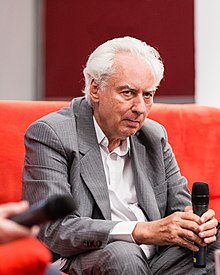
Lucian Blaga was a Romanian philosopher, poet, playwright, poetry translator and novelist. He was a commanding personality of the Romanian culture of the interbellum period.
Vintilă Horia was a Romanian writer, winner of the Prix Goncourt. His best known novel is God Was Born in Exile (1960).
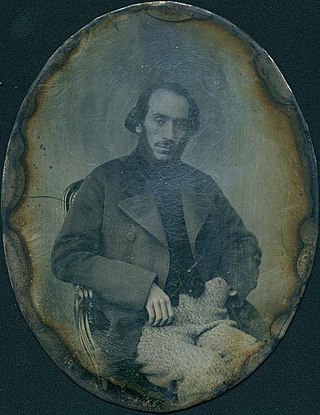
Nicolae Bălcescu was a Romanian Wallachian soldier, historian, journalist, and leader of the 1848 Wallachian Revolution.

Dacianism is a Romanian term describing the tendency to ascribe, largely relying on questionable data and subjective interpretation, an idealized past to the country as a whole. While particularly prevalent during the regime of Nicolae Ceaușescu, its origin in Romanian scholarship dates back more than a century.
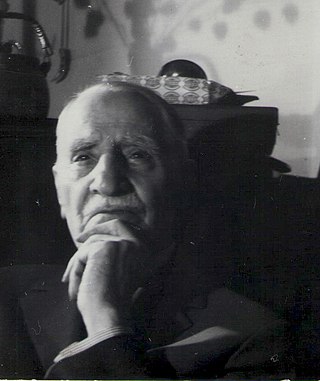
Iorgu Iordan was a Romanian linguist, philologist, diplomat, journalist, and left-wing agrarian, later communist, politician. The author of works on a large variety of topics, most of them dealing with issues of the Romanian language and Romance languages in general, he was elected a full member of the Romanian Academy in 1945. He was head of its Institute of Linguistics between 1949 and his retirement in 1962.
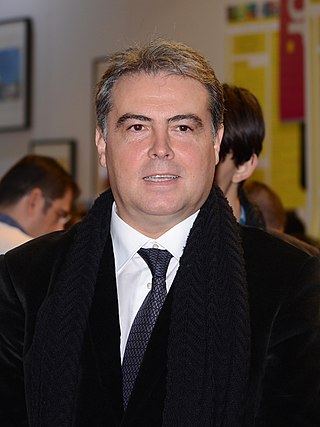
Adrian Mihai Cioroianu is a Romanian historian, politician, journalist, and essayist. A lecturer for the History Department at the University of Bucharest, he is the author of several books dealing with Romanian history. He is also noted for his contribution as co-author of a high school textbook.

Dumitru Țepeneag is a contemporary Romanian novelist, essayist, short story writer and translator, who currently resides in France. He was one of the founding members of the Oniric group, and a theoretician of the Onirist trend in Romanian literature, while becoming noted for his activities as a dissident. In 1975, the Communist regime stripped him of his citizenship. He settled down in Paris, where he was a leading figure of the Romanian exile.
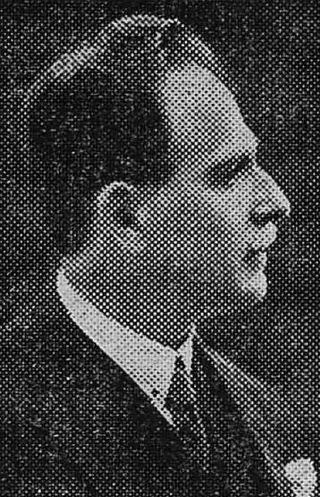
Alexandru Toma was a Romanian poet, journalist and translator, known for his communist views and his role in introducing Socialist Realism to Romanian literature. Having debuted as a Symbolist, Toma was influenced by 19th-century writer Mihai Eminescu, an admiration which came to characterize his entire work. The official poet during the early years of the Communist regime and appointed a full member of the Romanian Academy, he is considered by many commentators to have actually been a second-shelf writer, with a problematic legacy.
Mircea Florian was a Romanian philosopher and translator. Active mainly during the interwar period, he was noted as one of the leading proponents of rationalism, opposing it to the Trăirist philosophy of Nae Ionescu. His work, comprising some 20 books, shows Florian as a disciple of centrists and rationalists such as Constantin Rădulescu-Motru and Titu Maiorescu.
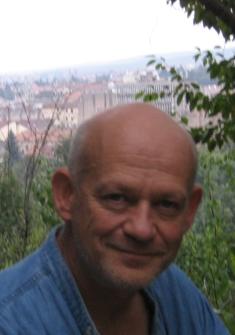
François Bréda was a Romanian essayist, poet, literary critic, literary historian, translator and theatrologist.
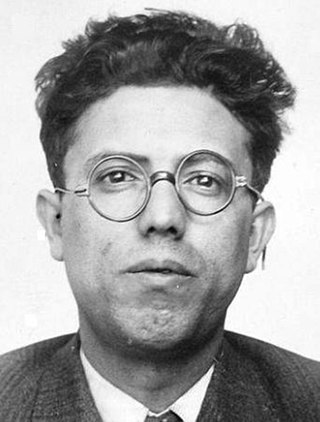
Mihail Roller was a Romanian communist activist, historian and propagandist, who held a rigid ideological control over Romanian historiography and culture in the early years of the communist regime. During his training in engineering, he rallied with the communist cells in Romania and abroad, joining the Romanian Communist Party while it was still an underground group. He collaborated with the Agitprop leaders Leonte Răutu and Iosif Chișinevschi, spent time in prison for his communist activity, and ultimately exiled himself to the Soviet Union, where he trained in Marxist historiography.
Magda Cârneci is a poet, essayist, and art historian born in Romania. She took a Ph.D. in art history at Ecole des Hautes Etudes en Sciences Sociales in Paris (1997) and received several international grants in literature and art history. Member of the well-known “generation of the ‘80s” in Romanian literature, of which she was one of the theoreticians, after the Revolution of December 1989 she became actively involved in the political and cultural Romanian scene of the 1990s. In the 2000s, after working as a visiting lecturer at the National Institute of Oriental Languages and Civilizations (INALCO) in Paris, she was the director of the Romanian Cultural Institute in Paris. At present, she is visiting professor at the National University of Arts in Bucharest, editor-in-chief of ARTA magazine for visual arts, and president of PEN Club Romania. She is also a member of the European Cultural Parliament.

The National Popular Party was an antifascist political party in Romania, founded during World War II as the underground Union of Patriots. The latter had defined itself as a spontaneous movement of resistance to the dictatorial regime of Ion Antonescu, but was largely known as a front for the illegal Romanian Communist Party. Its founders—Dumitru Bagdasar, Gheorghe Vlădescu-Răcoasa, Simion Stoilow—were closely cooperating with PCdR men, but also with liberal opposition forces. Repressed by the authorities, the UP made a comeback after the pro-Allied August 23 Coup of 1944, when it endured as a small ally of the communists—mostly controlled directly by them, but sometimes rebellious.

Traian Bratu was an Austro-Hungarian-born Romanian scholar of German language and literature. A native of the Mărginimea Sibiului region in present-day Sibiu County, southern Transylvania, he left for the Romanian Old Kingdom, where he attended university, followed up by a doctorate at the University of Berlin.
Stephan Roll was a Romanian poet, editor, film critic, and communist militant. An autodidact, he played host to the Romanian avant-garde at his father's dairy shop, publishing his work in short-lived reviews and in two volumes of poetry. As one of the editors of the magazine unu, he turned from Constructivism, Futurism and jazz poetry to the more lyrical format of Surrealism. Roll's political radicalism seeped into his avant-garde activity, and produced a split inside the unu group; Roll's faction discarded Surrealism in favor of proletarian literature, and affiliated with the underground Romanian Communist Party.
Alexandru Rosetti was a Romanian linguist, editor, and memoirist.
Niculae I. Herescu was a Romanian classical scholar, essayist, translator and poet. Descended from a noble family of Oltenia, he was trained in Latin and became a full professor at the University of Bucharest while still in his twenties. He translated widely from the Roman canon, as well as publishing a series of studies devoted to ancient writers. Meanwhile, Herescu wrote poetry of his own, and was president of the Romanian Writers' Society for several years. He left his native country shortly before a Soviet occupation began, and spent the last part of his life in exile, first in Portugal and then in France.

Ilie Bărbulescu was a Romanian linguist and philologist who specialized in the Slavic languages, also noted as a political journalist and Conservative Party cadre. Academically trained in his native country and the Kingdom of Croatia-Slavonia, he investigated in particular the Slavic influence on Romanian and the origins of Romanian literature, with additional interests in Old East Slavic and Russian literature. He was a corresponding member of the Romanian and Serbian Academies, and helped establish a Slavic studies department at the University of Iași. Bărbulescu was nevertheless a controversial figure, deeply involved in academic rivalries, and taking up unpopular political stances—especially during World War I, when, contrary to his background in Slavistics, he took up "Germanophilia", rooting for the Central Powers.

Lidia Vianu is a Romanian academic, writer, and translator. She is a professor in the English department of the University of Bucharest, a writer of fiction and poetry, and a translator both from English into Romanian, and from Romanian into English.
Events from the year 1947 in Romania. The year saw the abdication of Michael I of Romania and foundation of the Romanian People's Republic.
